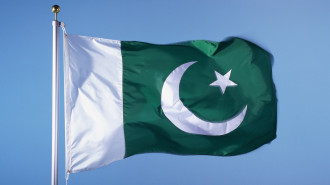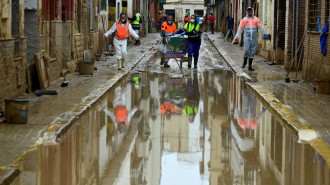US Climate Envoy John Kerry attends UAE Climate Dialogue to solidify Paris Agreement commitments
US Climate Envoy John Kerry attends UAE Climate Dialogue to solidify Paris Agreement commitments
The United States Special Presidential Envoy for Climate attended the regional climate dialogue, where MENA countries re-committed to the Paris Agreement.
3 min read
John Kerry has been pushing for climate change work in the Middle East [Getty]
The US Climate Envoy John Kerry joined delegates from the Middle East and North Africa in Abu Dhabi for its Dialogue for Climate Action meeting, ahead of the 26th United Nations Climate Change Conference of the Parties (COP26) happening later this year.
Kerry attended the conference and met with Abu Dhabi Crown Prince Sheikh Mohammed bin Zayed, where the pair discussed ways the US and UAE could collaborate to protect the environment.
They "stressed the importance of concerted efforts and joint international work with international organisations to accelerate the creation of smart and sustainable solutions to reduce the impacts of climate change on societies, help countries achieve their climate goals, and ensure a more sustainable future for humanity."
Kerry's attendance was an important step to global climate cooperation, said UAE Minister of Climate Change and Environment Abdullah Al-Nuaimi.
"The challenges posed by climate change and the negative impacts it creates are clear to the international community as a whole, and the problem is that the severity of these impacts is increasing at an accelerating pace, which requires accelerating global efforts to reduce the severity of this change and enhance the capabilities to adapt to its repercussions to ensure a sustainable future," he said during the conference.
Attendees, including the UAE, Oman, Kuwait, Bahrain, Qatar, Egypt, Jordan, Morocco, Iraq, Sudan, and the US signed a joint statement urging global powers to stick to Paris Agreement commitments.
"As we pass through a critical decade for climate change, we believe that investments in renewable energy, adopting methodologies based on protecting ecosystems, applying nature-based solutions, climate-smart agriculture, carbon capture techniques and other solutions to reduce carbon emissions will contribute in supporting sustainable economic growth and creating more job opportunities," the joint statement read.
This was Kerry's first visit to the Middle East since being appointed to the role of climate envoy in Joe Biden's administration and a rare moment of travel amid the coronavirus pandemic.
The UAE's renewable energy commitments
Kerry visited Abu Dhabi's Noor solar park - the largest single-site solar park in the world - over the weekend, and was later shown another solar development, Shams 1, near the Zayed City in Al-Dhafra.
The Noor Solar Plant reduces the emirate’s carbon emissions by 1 million tons annually. This is the equivalent to removing 200,000 vehicles from the roads.
The UAE has committed to reducing its greenhouse gas emissions by 2030 by 23.5 percent.
It launched the UAE Energy Strategy 2050, which aims at increasing clean energy usage by 50 percent in the total energy usage of the kingdom by 2050, to reduce the carbon footprint by 70 percent, and increase consumption efficiency of companies and individuals by 40 percent.
The dialogue comes ahead of COP26, which is set to be hosted by Scotland on 1 November 2021.
Kerry attended the conference and met with Abu Dhabi Crown Prince Sheikh Mohammed bin Zayed, where the pair discussed ways the US and UAE could collaborate to protect the environment.
They "stressed the importance of concerted efforts and joint international work with international organisations to accelerate the creation of smart and sustainable solutions to reduce the impacts of climate change on societies, help countries achieve their climate goals, and ensure a more sustainable future for humanity."
Kerry's attendance was an important step to global climate cooperation, said UAE Minister of Climate Change and Environment Abdullah Al-Nuaimi.
"The challenges posed by climate change and the negative impacts it creates are clear to the international community as a whole, and the problem is that the severity of these impacts is increasing at an accelerating pace, which requires accelerating global efforts to reduce the severity of this change and enhance the capabilities to adapt to its repercussions to ensure a sustainable future," he said during the conference.
Attendees, including the UAE, Oman, Kuwait, Bahrain, Qatar, Egypt, Jordan, Morocco, Iraq, Sudan, and the US signed a joint statement urging global powers to stick to Paris Agreement commitments.
|
"As we pass through a critical decade for climate change, we believe that investments in renewable energy, adopting methodologies based on protecting ecosystems, applying nature-based solutions, climate-smart agriculture, carbon capture techniques and other solutions to reduce carbon emissions will contribute in supporting sustainable economic growth and creating more job opportunities," the joint statement read.
This was Kerry's first visit to the Middle East since being appointed to the role of climate envoy in Joe Biden's administration and a rare moment of travel amid the coronavirus pandemic.
The UAE's renewable energy commitments
Kerry visited Abu Dhabi's Noor solar park - the largest single-site solar park in the world - over the weekend, and was later shown another solar development, Shams 1, near the Zayed City in Al-Dhafra.
The Noor Solar Plant reduces the emirate’s carbon emissions by 1 million tons annually. This is the equivalent to removing 200,000 vehicles from the roads.
The UAE has committed to reducing its greenhouse gas emissions by 2030 by 23.5 percent.
It launched the UAE Energy Strategy 2050, which aims at increasing clean energy usage by 50 percent in the total energy usage of the kingdom by 2050, to reduce the carbon footprint by 70 percent, and increase consumption efficiency of companies and individuals by 40 percent.
The dialogue comes ahead of COP26, which is set to be hosted by Scotland on 1 November 2021.







 Follow the Middle East's top stories in English at The New Arab on Google News
Follow the Middle East's top stories in English at The New Arab on Google News


